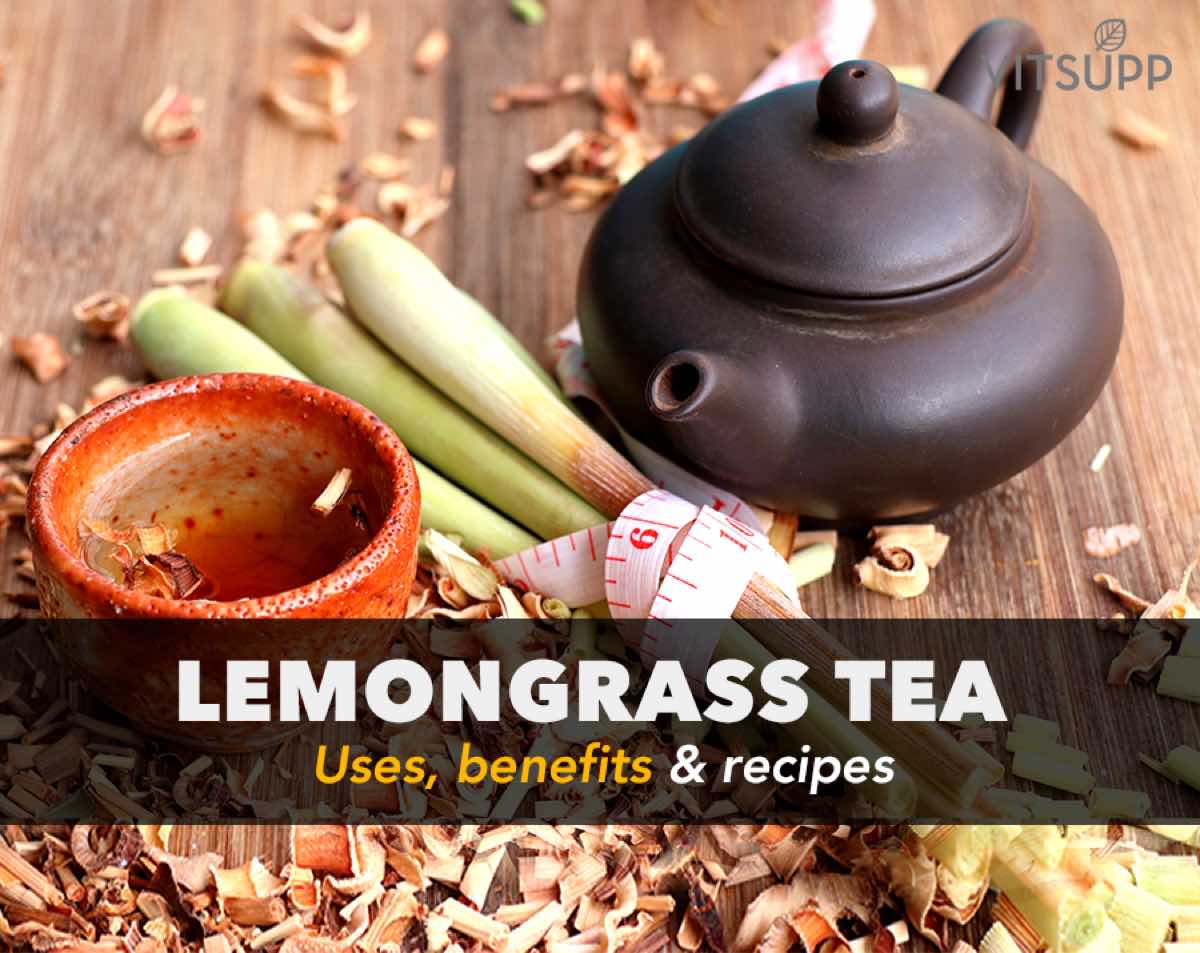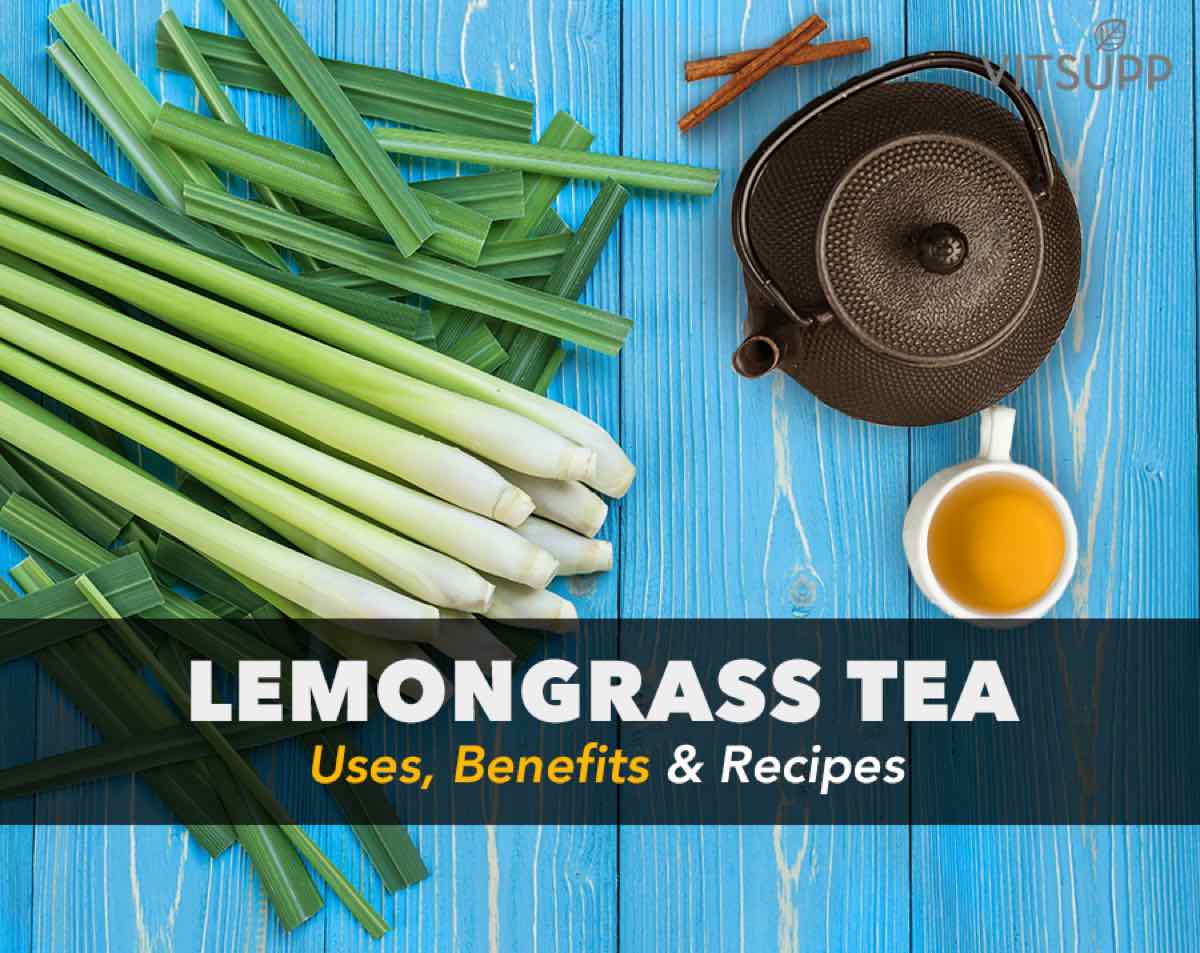Love the lemon flavour? Then there’s no better herb than lemongrass. But what’s better than good old lemongrass in culinary specialities? Lemongrass tea!
If you haven’t tried it already, then this article will give you every reason to get some lemongrass tea bags right away, because apart from its amazing citrus flavour, drinking lemongrass tea has numerous health benefits. Read on.
Contents
What is the lemongrass tea plant
Lemongrass plant, also known as Cymbopogon, Cochin grass, or Malabar grass, is a type of grass that is known for its citrus-like flavour.
It is a tall, perennial plant that is used for culinary, medical, and therapeutic purposes. (1)
Lemongrass usually grows in clusters in subtropical or tropical regions.
So, it’s easy to find this plant in India, Sri Lanka, the USA, Brazil, Southeast Asia, Africa, and Laos, to name a few.
It is most commonly used in Thai and Vietnamese cuisines.
Lemongrass essential oils are also used in spas and for cosmetic purposes.
Incidentally, India happens to be the world’s largest producer of lemongrass. (2)
Now lemongrass tea, is simply an herbal tea made with lemongrass.
Lemongrass leaves are usually infused or boiled with water to prepare this tea.
You can find lemongrass tea leaves in stores, or you can grow it at home as well.
How to choose fresh lemongrass
The rule is simple. Go for fresh, green leaves. Keep these things in mind as well –
- Make sure the stalks are firm. Avoid picking rubbery or soft stalks, as these types do not have a very rich flavour.
- Avoid rusted, old, and dried leaves. The ones with brown outer leaves are too old and most likely not useful.
- A good healthy lemongrass stalk is yellow towards the bottom, with green upper stalks. (5)
If you plan on storing lemongrass for a longer period of time, then keep these things in mind –
- Trim them well and store it in the refrigerator. They can last for close to two weeks like this.
- You can also cut the stalks into small pieces and dry it out in the sun. After this, it can be either stored in a dry, airtight container or powdered.
- In case the stalks or the plants have dried, you can grow them again like how we’ve mentioned above. (6)
Lemongrass tea benefits and side effects

Dr. Rashmi Byakodi, a health and wellness writer and editor of Best For Nutrition told us, “Lemongrass possesses numerous antioxidants such as isoorientin, chlorogenic acid, and Swertia japonica, which aids in hunting free radicals that may cause diseases. The anti-inflammatory property of Lemongrass is attributed to the presence of compounds citral and geraniol, which help in preventing the release of certain inflammation-causing markers in our body. Lemongrass extract also assists in lowering high cholesterol levels.”
There are several health benefits of lemongrass tea, just like green tea. A few effects of lemongrass tea are as follows-
Benefits of lemongrass tea
- Lemongrass has antioxidant properties, which can help treat the imbalance of free radicals and oxidative stress
- Can help regulate blood pressure
- Helps with weight loss
- Lemongrass tea helps relieve anxiety and stress
- Helps in the prevention of infections and protects the immune system
- Its anti-inflammatory properties help treat inflammation and relieve pain
- May help in gastrointestinal disorders
- Can help with anaemia
- Has potential anti-cancer properties
- Helps relieve bloating and edema (7)
Lemongrass tea side effects

We asked Carrie Lam, MD, FAAMFM, ABAARM, at Dr. Lam Coaching about lemongrass and its effect on the body. She said, “Potential side effects of lemongrass are few, and it does not appear to interact with other drugs or supplements. Pregnant women and those who are breastfeeding should not use lemongrass. People with kidney or liver disease should avoid this product. Those allergic to lemongrass should not expose themselves to the grass or its oils.
Lemongrass has no serious side effects, and scientists consider it as a safe herb. In fact, its antimicrobial, anti-inflammatory, and antioxidant properties make it a great herb with several benefits for your body.
However, it can induce menstrual flow. So women who are pregnant are advised against the consumption of lemongrass. [10]
This is the only known side effects of drinking lemongrass tea.

Lemon grass tea and pregnancy
Not all should opt for this beverage. While discussing lemon grass tea benefits and side effects, it is important to talk about the vulnerable groups, too. Women who are pregnant or breastfeeding must choose their food and beverages carefully. It will help them avoid any unwanted health implications.
There is limited research on the impact of lemon grass tea during pregnancy. So, it is better not to have it without consulting your doctor. Lack of information about its content may create issues for the new mothers. Any side effects from lemon grass tea may affect the foetus or the mother. Hence, it is better not to consume lemon grass tea in pregnancy. Now, there can be instances when you are too late. At times, women panic, saying, “ I drank lemongrass tea while pregnant “. If you have, then it’s better to go for a checkup or consult your gynecologist. Stress during this phase is the worst thing you can do to your unborn baby. Stay informed with VitSupp and lead a healthy life.
How to make lemongrass tea for weight loss
Making lemongrass tea is no rocket science. It is simple to make, and incredibly tasty and calming.
- Cut lemongrass leaves or stalks into small pieces of about one or two inches.
- Fill a vessel with a cup of water and bring it to boil
- Pour the boiling water into a cup, and add the pieces of lemongrass into it, to steep
- Let this be this way for about five minutes
- Use a strainer to strain the tea into a cup.
An alternative way to prepare this is to boil the lemongrass along with the water. The flavours are richer this way. You can use lemongrass tea leaves or tea bags to make this tea as well. (8)

Lemongrass Infused Water Benefits
- It is known that proper hydration is good for your health and skin. While having plain water throughout the day can be boring, often leaving your dehydrated, infused water can do wonders. Lemongrass-infused water has a certain flavour which makes it more appealing. Therefore, it helps you stay hydrated without offending your taste buds. However, pregnant or breastfeeding women may consult with their doctors before proceeding.
- As lemongrass can be helpful for stomach bloating, the water infused with it can aid in your digestion. It helps you eliminate gas, which is one of the most common problems in India, affecting people of all ages. Instead of having prescribed medications when it gets worse, it is better to prevent it by following traditional digestive methods like lemon grass water.
- In case you do not have any health implications, you can replace it with your sugary beverage for refreshment. Zero calories and sugar in this water help you stay relaxed while managing your cravings.
Lemongrass Tea Recipe
Drinking lemongrass tea is not limited to the one way mentioned above. There are several other recipes for the same. Here is how to use lemongrass for tea:
Lemongrass herbal tea with ginger extracts
- Chop lemongrass leaves or stalks to an inch or two, and wash them
- Chop a few slices of ginger. You will not require much. Just an inch should suffice
- Bring a cup of water to boil in a vessel. Add lemongrass and ginger extracts and continue to boil for two to three minutes
- Use a strainer to strain the tea into a cup
- You can add a sweetener of your choices like honey, jaggery, or sugar (9)
Ginger is a carminative, so it is great for treating gastrointestinal issues like bloating and excessive flatulence.
Lemongrass iced tea
If you’re in the mood for something chilled, then this should do the trick
- Chop lemongrass leaves or stalks to an inch or two, and wash them
- Bring a cup of water to boil in a vessel. Add the lemongrass leaves or stalks and continue to boil for two to three minutes
- Use a strainer to strain the tea into a cup
- Wait till it cools down, and then store it in the refrigerator
- Once it has cooled, squeeze a little bit of lime juice, and enjoy! (10)
This recipe can help detox and cool your body down.
Lemongrass and mint leaves
- Chop lemongrass leaves or stalks to an inch or two, and wash them
- Wash about four to five mint leaves and keep aside
- Bring a cup of water to boil in a vessel. Add the lemongrass leaves or stalks and continue to boil for two to three minutes
- Use a strainer to strain the tea into a cup
- Add a sweetener of your choice, like honey, jaggery, or sugar
- Throw in the mint leaves on top, before drinking it
Mint leaves have several health benefits. It can relieve indigestion, help with cold and flu, relieve sore throat, prevent mouth odours, and even improve brain function.
Guess what? There’s something else you can use lemongrass for. Your very own DIY recipe for skin and hair! Here’s how… (11)
DIY Lemongrass for skin

Nutritionist Vasundhara Agrawal gave us insights into the use of lemongrass on hair and skin. She said, “Organic lemongrass essential oil has purifying properties which make it perfect for skin care. These properties help remove impurities, detoxify the skin and leave it feeling clean and clear. Antioxidants are good for you as they help to neutralize damaging free radicals, which can be harmful to your skin. Lemongrass oil is an effective dandruff treatment. Mix a few drops into your shampoo or conditioner daily, and make sure it’s massaged into your scalp.”
Treat breakouts with lemongrass! Boil lemongrass with water, cool it down and rinse your face with this regularly.
For a lemongrass face scrub, Grind some lemongrass with olive or coconut oil. To this paste, add some sea salt. Use this mix as a face scrub to enhance circulation. (12)
DIY Lemongrass wash for hair
Lemongrass has antiseptic and antimicrobial properties. This means it can protect your scalp from inflammation, dandruff, and excessive shedding. All you have to do is soak some lemongrass in water and then boil it. After it has cooled down, rinse your hair with this. (13)
Conclusion
With lemongrass tea, you will enjoy great health benefits. According to the Food and Development Authority, lemongrass is considered safe for consumption, and there are no side effects per se.
However, this herb can induce menstrual flow, so it is best to stay away from it in case you are pregnant.
The next time you find yourself in the supermarket, make sure you get some lemongrass leaves, tea bags, extracts, or powder to make the perfect brew!
FAQs
The amount of lemongrass tea you consume will depend on many factors. For example, your age and medical history can influence how much lemongrass tea is safe for you to drink. Some people also have more sensitive bodies than others and may need to drink less tea.
Overall, it is usually recommended that you start with a small amount of lemongrass tea and gradually work your way up to a larger serving size. This will allow your body time to get used to the effects of the tea. Many experts recommend drinking no more than two cups per day to be on the safe side.
If you have any concerns about how much lemongrass tea is safe to drink, it is best to speak with your doctor. They can help you determine a serving size that fits your specific needs and lifestyle.
To use lemongrass in tea, start by heating water to a boil. Add one or two stalks of lemongrass that have been cut into small pieces. Allow the tea to steep for 5-10 minutes, and then strain out the lemongrass before drinking. You can also add honey and lemon juice for sweetness and extra flavor.
If you are using lemongrass powder, add a small amount to boiling water and stir until it has dissolved. Then, follow the same instructions for brewing as with fresh lemongrass stalks. Lemongrass powder is also great for adding extra flavor to curries and other dishes.
First, you will need to cut the lemongrass leaves into small pieces. Next, spread the pieces out on a baking sheet and place them in a preheated oven set to the lowest possible temperature. Leave the lemongrass in the oven until it is completely dried out; this could take several hours. Once it is dry, remove the lemongrass from the oven and allow it to cool. Once it is cooled, store the lemongrass in an airtight container until you are ready to use it. When you are ready to use the lemongrass, simply steep it in hot water for a delicious and refreshing cup of tea.
Lemongrass is a type of grass used to flavor food, while green tea is made from the leaves of the Camellia sinensis plant. Lemongrass has a citrusy, lemon-like flavor, while green tea has a grassy flavor. Lemongrass is often used in savory dishes, while green tea is most commonly consumed as a beverage. Lemongrass is often used in savory dishes, while green tea is most commonly consumed as a beverage.
However, there are some similarities between lemongrass and green tea. Both are commonly used in Asian cuisine, and both have health benefits that have been documented by scientific research.
Most of you are unfamiliar with the outcomes when lemongrass tea and pregnancy come together. We often come across a question, “ Can pregnant women drink lemon grass tea? “. Some women may find that lemongrass tea helps them with morning sickness or other pregnancy-related symptoms, while others may not be able to tolerate its taste or smell. If you’re pregnant and considering drinking lemongrass tea, it’s best to discuss this with your healthcare provider before deciding.
Overall, lemongrass tea is thought to be safe for most adults when consumed in moderation. However, pregnant women should be cautious about drinking it due to the lack of scientific evidence regarding its safety during pregnancy.
Making lemongrass tea is one of the best ways to enjoy the benefits of this amazing herb. Lemongrass is known for aiding in weight loss, and drinking a cup of this tea daily can help you shed those extra pounds.
To make lemongrass tea, start by boiling water and adding a few lemongrass stalks to the pot. Allow the water to steep for about 10 minutes, then remove the lemongrass and pour the tea into a cup. You can enjoy your lemongrass tea hot or cold, and it’s best to drink it on an empty stomach for maximum effect. Drink 1-2 cups of lemongrass tea daily to help lose weight.
Lemongrass is an excellent herb for the skin. It has antiseptic, anti-inflammatory, and anti-bacterial properties, making it useful in treating acne, eczema, and other skin conditions.
Lemongrass can be used in various ways to improve your skin’s health.
One way to use lemongrass for skin is to make tea from the leaves. This tea can be used as a facial wash or toner. It will help cleanse and tone the skin while providing some important nutrients.
Another way to use lemongrass for skin is to add it to a bath. This will help soothe and relax the body while providing some benefits for the skin.
Lemongrass can also be used topically on the skin. It can be made into a paste and applied to acne-prone areas or added to lotions and creams. Either way, lemongrass will help to improve the appearance of the skin.
Lemongrass is a perennial herb that is native to tropical Asia. It is widely used in Asian cuisine for its citrus flavor. Lemongrass can be grown from seed, but starting with a young plant from a nursery is easier.
To grow lemongrass, start by planting the young plant in a drainage hole pot. Fill the pot with a mix of 1 part peat moss and 1 part perlite. Water the plant well and place it in a sunny spot.
Lemongrass prefers warm weather, so it is best to grow it outdoors in the summer. If you live in a colder climate, you can grow lemongrass indoors near a sunny window.
Water the plant regularly, ensuring the soil stays moist but not soggy. Apply a balanced fertilizer every 2-3 weeks during the growing season.
Harvest lemongrass by cutting off the bottom 6 inches of the stalks. Use a sharp knife so you don’t damage the plant. You can use lemongrass fresh or dried in many Asian dishes.
First, cut off the bottom root and brown leaves to store lemongrass. Cut the stalk into 1-inch pieces and place them in a resealable bag. Store the lemongrass in the fridge for up to two weeks. You can also freeze lemongrass for longer storage. First, blanch the lemongrass by boiling it for two minutes. Then, place the lemongrass in a freezer-safe bag and store it in the freezer for up to six months.
Lemongrass oil can be a natural remedy for many ailments, including headaches, stomachaches, and even arthritis. Making your lemongrass oil is easy and only requires a few ingredients.
-1 cup of lemongrass leaves
-1 cup of carrier oil (such as jojoba oil or coconut oil)
-1 Mason jar
-A strainer
-A dark glass bottle for storage
Directions:
1. Start by drying the lemongrass leaves. You can spread them out on a towel and let them sit in a warm, dry place for a few hours.
2. Once the leaves are dry, add them to the Mason jar.
3. Pour the carrier oil into the jar, covering the leaves completely.
4. Screw on the lid and shake well.
5. Place the jar in a sunny spot and let it infuse for 2-3 weeks, shaking occasionally.
6. After 2-3 weeks, strain the oil into the dark glass storage bottle.
7. Lemongrass oil will keep for up to 6 months when stored in a cool, dark place.
Like any other consumables, this beverage can also cause side effects to certain individuals. While it may not be life-threatening, it can result in adverse health issues. There are three ways lemongrass can be used. It can be taken orally, applied to the skin, and inhaled. While the other methods are considerably safe, applying them to your skin can make an adverse impact, e.g., rashes.
It can be itchy and make your confidence level go down. Lemongrass tea side effects are more common with essential oils with lemongrass as an ingredient. It is preferable for pregnant women and patients going through procedures like chemotherapy to avoid this beverage. If you are on blood thinners, it is better to avoid consuming anything with lemongrass as an ingredient. For more such interesting facts, follow VitSupp.
It is generally safe for consumption, irrespective of frequency. Also, it should not cause any harm to your body. However, moderation is preferable when it comes to having a food or beverage every day. It helps to manage digestion issues, lowers stress levels, is good for weight loss, is rich in antioxidants, etc. Due to these core benefits, many people tend to drink lemongrass tea on a daily basis.
However, you should always consult with a physician before consuming it daily. It is applicable to the ones with certain health conditions or who are pregnant. Breastfeeding mothers must also refrain from having lemongrass tea regularly. It may not be unhealthy, but moderation is a better idea. Keep following VitSupp for more information on health and wellness.
It is not clearly known whether this beverage affects human hormones due to limited research. However, the effects can be analysed by going through its components. Generally, it is safe to consume Lemongrass tea. However, you must consult with a clinician if you have any hormone-related conditions.
Citral is the key component of lemongrass. It is known for its anti-estrogenic property. Also, lemongrass has a mild diuretic effect. Although it is not directly associated with hormones, it can cause mild stress. This results in a brief impact on cortisol. This hormone is associated with stress. Lemongrass has anti-inflammatory properties. Therefore, it supports hormonal health by reducing inflammation in your body.
Lemongrass tea has multiple health benefits. Therefore, you can have it any time of the day, unless you are experiencing any healthcare issues. In that context, you must consult with a doctor. For the rest, they can have lemon grass during some specific times to maximize its goodness. For example, you can have it first thing in the morning after you wake up. Having lemongrass tea on an empty stomach aids in digestion and promotes antioxidants in the body.
Taking it before a meal can raise your appetite and have a good meal. While lemongrass tea after a meal is not a common practice, it helps with digestion. This is also a refreshing palate cleanser. Therefore, you can have it after 20 minutes of your lunch. As for dinner, having this tea at night is not recommended. Hence, the best time to have lemon grass is in the morning for a gentle and energetic start to your day.
With fast food being easily available, obesity has become a common problem. Hence, individuals tend to look for food or beverages that help to maintain a healthy weight. Lemongrass tea is found to be beneficial for weight loss. Although it plays no role in breaking down the fat cells or increasing metabolism. However, it supports managing a healthy weight in various ways. For instance, lemongrass tea is a hydrating beverage with low sugar content.
Therefore, individuals who daily consume sugary beverages may drink this instead. This will manage their craving, keep them hydrated, and prevent overweight or obesity. While there is no best time to drink lemongrass tea for weight loss, having it on an empty stomach is preferable.


